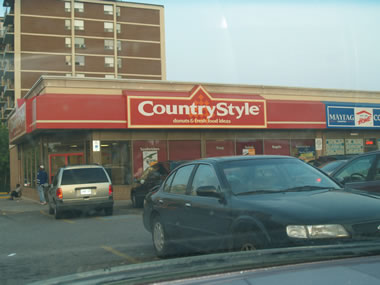Yusuf Mohamud
Hiiraan Online
Sunday, September 23, 2007
 |
|
CountryStyle at Dixon, Toronto - The biggest "Fadhi-ku-dirir" in North America
 |
SEATTLE, Washington - The men gather in crowds of two, three, or as many as twenty at times, in a circle of political debate about the future of their homeland. They include a segment of the Somali male population, anywhere between the teenage years to senior citizenry. Not all talk is political, however.
It’s just that political debate (“fadhi-ku-dirir”) draws in the most loyal conversationalists. White Star Café, on a corner of Military Road in Tukwila renowned for Somali-owned businesses, is lit every single day of the week, from 9am until midnight (schedule changes for Ramadan currently in effect). The men eat sambuusa and drink tea, play table games or use the Internet, but perhaps most importantly, converse about the day’s news.
No, not the daily happenings in Tukwila or Seattle. Conversation at White Star is primarily concentrated on Somalia, thousands of miles away, where war rages between a foreign-backed provisional government and Islamic rebels. Talk here is of the ancient enmity between the Somalis, as a people, and their giant Ethiopian neighbors to the west. Even on this, there is little conformity among the average day’s debaters.
Mohamed, 27, works at Seattle-Tacoma International Airport in the customer service sector. He says his father died in the 1977 war between the Somali and Ethiopian armies. “He died for his people…and now the enemy he fought is in Mogadishu,” Mohamed says.
He demands the Ethiopian army withdraw immediately and says the rebels are “given a bad name by the press.”
One of Mohamed’s closest friends, Omar, 34, disagrees with him and argues that the Ethiopian army is in Somalia to help establish a government, “because Somali people cannot help each other.”
“Somali killed Somali for 17 years and tore apart the whole country. It is time for change and government. You can change a bad government but how long can you live without any government?” Omar wonders.
He says he is tired of being a refugee in another man’s land and longs for a peaceful, governed Somalia. He dreams of owning a home overlooking the sandy beaches of Brava, an old port city along the East African country’s southern coast.
The real debate in Somalia, much like debate here at White Star, is centered on the human need for law and governance. But lively discussions here stemmed from social gatherings of Diaspora Somali men that have with time transformed into a sort of tradition.
Unlike Somalia, however, the political atmosphere here is friendly and respectful despite the polarized views, and not least because debate here was cultivated under the watchful eye of a lawful society.
These men are refugees who fled conflict and devastation; they know the unholy price of violence. They have learned about the way of the gun through tormenting personal experience, and in the midst of heated arguments, offer their prayers to those civilians caught in the crossfire and to those innocents displaced by war.
It is too early to say whether or not Omar’s dream of buying a home in Brava will be realized anytime in the foreseeable future. What is quite clear, however, is that while customers at this Tukwila teashop engage in open debate about their homeland, their brethren back in Somalia are waging the real war that will ultimately determine the future of this troubled country.